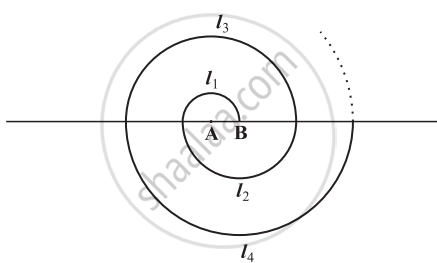Advertisements
Advertisements
Question
Find the sum of the following Aps:
9, 7, 5, 3 … to 14 terms
Solution
The given AP is 9, 7, 5, 3,……….
Here, a = 9 and d = 7 - 9 = - 2
Using the formula, `s_n = n/2 [ 2a + (n-1) d] ,` we have
`s_14 = 14/2 [ 2 xx9 + (14 -1) xx (-2 )]`
`= 7 xx (18-26)`
= 7×(-8)
=-56
APPEARS IN
RELATED QUESTIONS
The sum of n terms of three arithmetical progression are S1 , S2 and S3 . The first term of each is unity and the common differences are 1, 2 and 3 respectively. Prove that S1 + S3 = 2S2
How many terms of the AP. 9, 17, 25 … must be taken to give a sum of 636?
A spiral is made up of successive semicircles, with centres alternately at A and B, starting with centre at A of radii 0.5, 1.0 cm, 1.5 cm, 2.0 cm, .... as shown in figure. What is the total length of such a spiral made up of thirteen consecutive semicircles? (Take `pi = 22/7`)

[Hint: Length of successive semicircles is l1, l2, l3, l4, ... with centres at A, B, A, B, ... respectively.]
How many three-digit numbers are divisible by 9?
Write an A.P. whose first term is a and common difference is d in the following.
a = –19, d = –4
The sum of first n odd natural numbers is ______.
Find the value of x, when in the A.P. given below 2 + 6 + 10 + ... + x = 1800.
How many terms of the A.P. 27, 24, 21, …, should be taken so that their sum is zero?
Find the sum of natural numbers between 1 to 140, which are divisible by 4.
Activity: Natural numbers between 1 to 140 divisible by 4 are, 4, 8, 12, 16,......, 136
Here d = 4, therefore this sequence is an A.P.
a = 4, d = 4, tn = 136, Sn = ?
tn = a + (n – 1)d
`square` = 4 + (n – 1) × 4
`square` = (n – 1) × 4
n = `square`
Now,
Sn = `"n"/2["a" + "t"_"n"]`
Sn = 17 × `square`
Sn = `square`
Therefore, the sum of natural numbers between 1 to 140, which are divisible by 4 is `square`.
Find the sum of those integers between 1 and 500 which are multiples of 2 as well as of 5.
